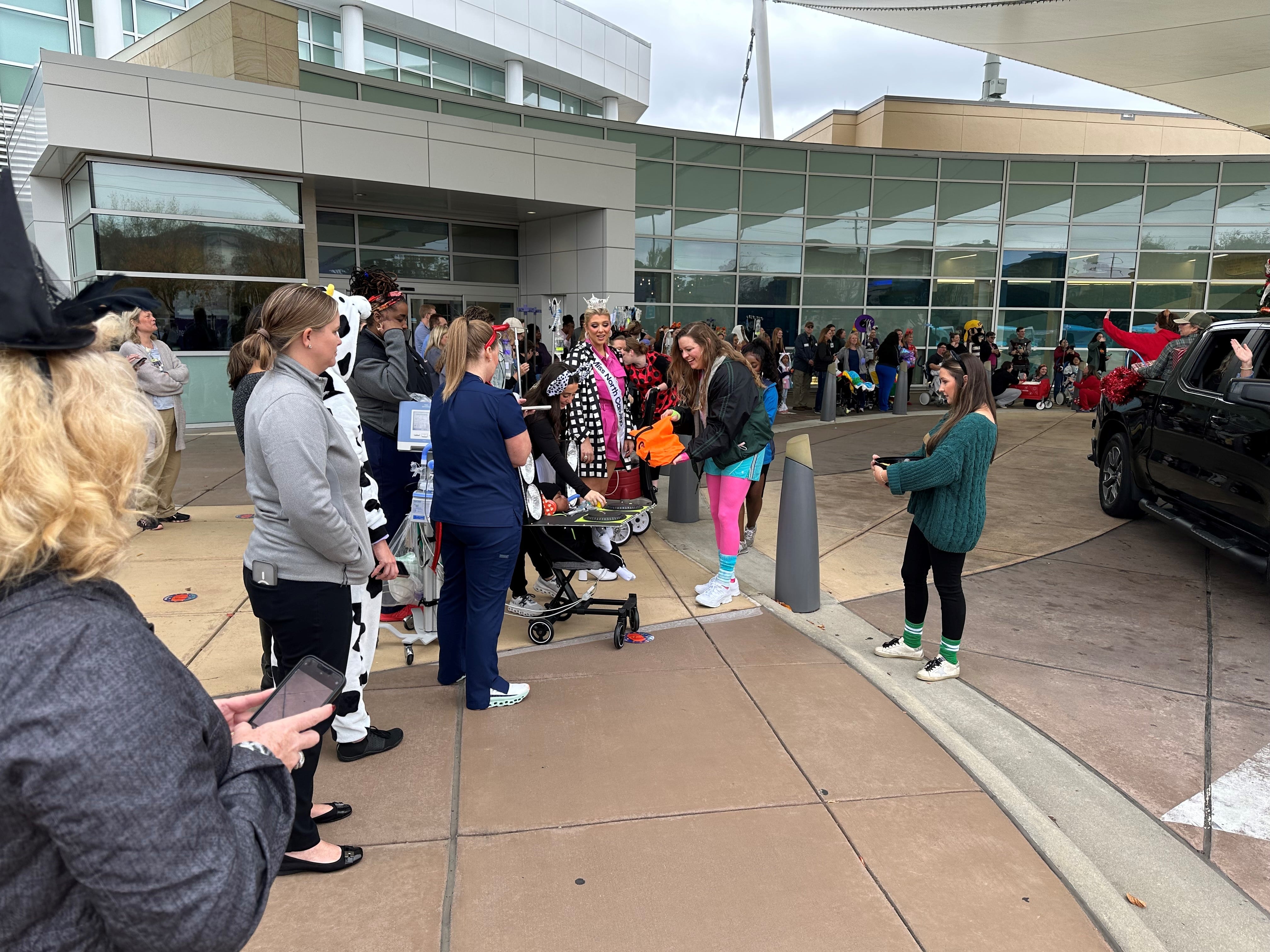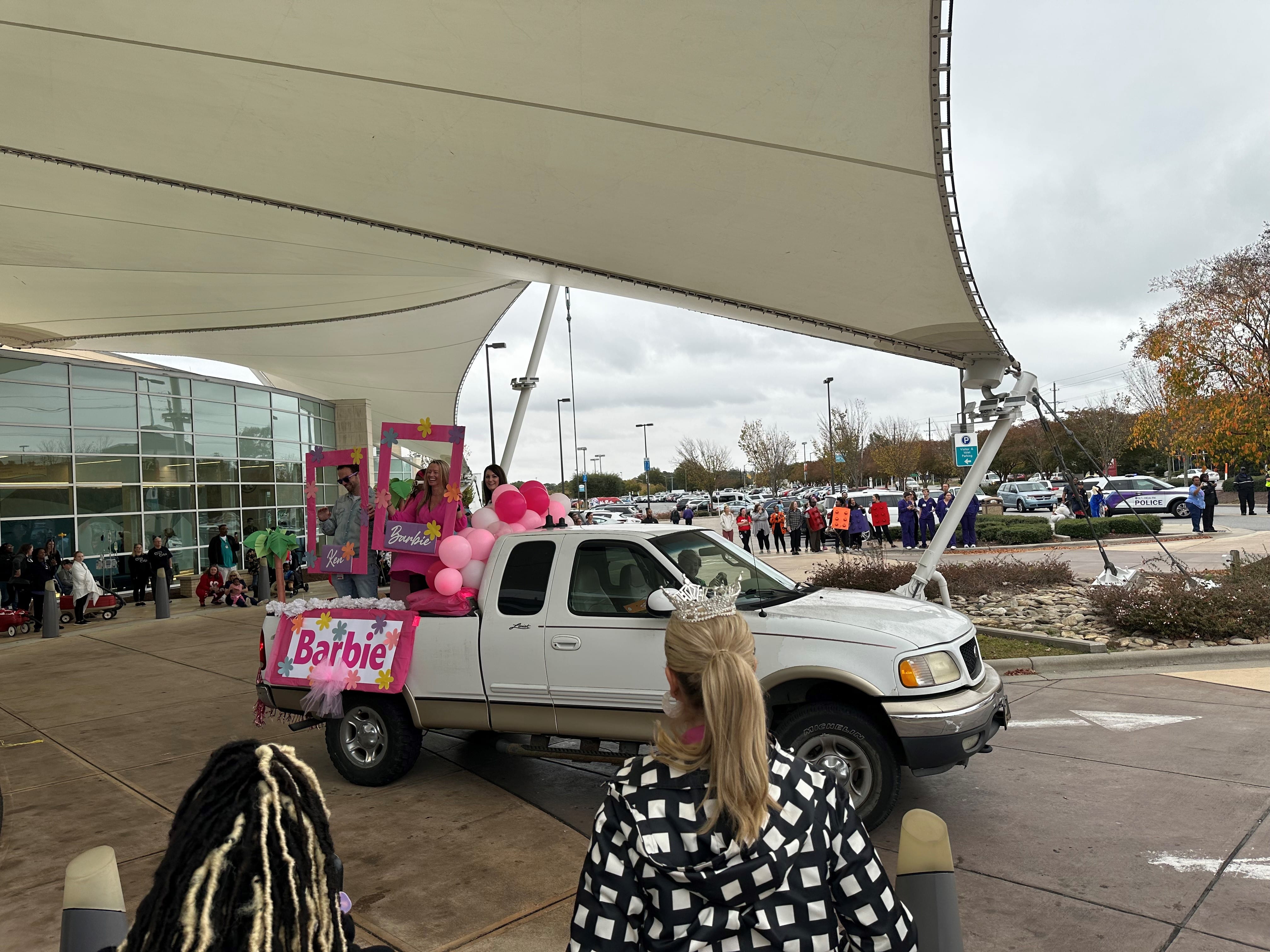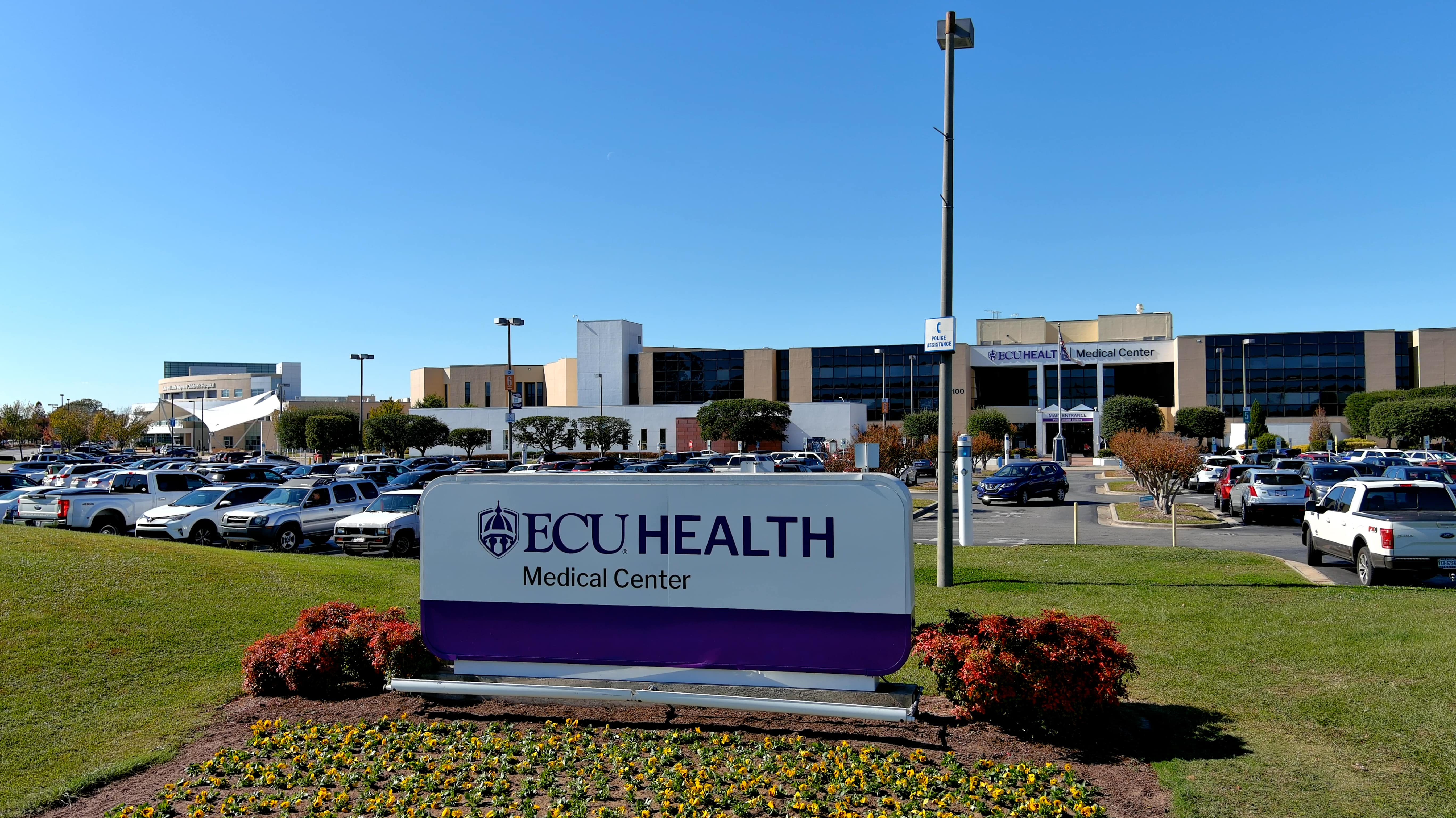Dr. Audy Whitman is an eastern North Carolinian, through and through. He was born in the farming town of Seven Springs – a town of roughly 80 people – in Wayne County.
Like in many towns in eastern North Carolina, its citizens struggle with poverty and access to health care. It is there, in Seven Springs, where Dr. Whitman’s rural upbringing helped him discover a love for medicine that influences his work today.
Today, Dr. Whitman is a family medicine physician for ECU Health and clinical assistant professor at the Brody School of Medicine at East Carolina University, but back in Seven Springs, he was a helping hand in the tobacco fields, braving the eastern North Carolina heat and humidity.
“There is no more powerful motivator in the universe, in my humble opinion, than standing in the middle of a tobacco field in the late summer with 99 percent humidity, no shade and it’s 100 degrees outside,” Dr. Whitman said. “Your hands are caked with tobacco gum. The nicotine is soaking through your skin, so you feel nauseous all the time. Those long days taught me a great work ethic but they were also powerful motivators.”
Rural health care realities
Americans who live in rural areas make up 20% of the United States population and residents in these areas face a myriad of challenges: shorter life expectancy, higher mortality, higher rates of poverty, fewer local doctors and greater distances to travel to see health care providers. Only 10% of U.S. physicians currently practice in rural areas.
Physician shortages are no secret across the country, with the Association of American Medical Colleges estimating a shortage of up to 124,000 physicians by 2034, and rural areas are at an even greater risk.
The Brody School of Medicine was founded over 40 years ago to train primary care physicians to provide care for rural eastern North Carolina. These challenges inform the medical school’s mission and its proven track record is best represented by the fact that Brody is No. 1 in North Carolina and No. 2 in the United States in the percent of graduates in the last decade who chose careers in family medicine.
Programs like the Rural Family Medicine Residency Program take that work a step further by focusing on initiatives that help place providers in rural areas. Studies show that family medicine residents who spent 50% or more of their training time in rural settings were at least five times more likely than residents with no rural training to practice in a rural setting.
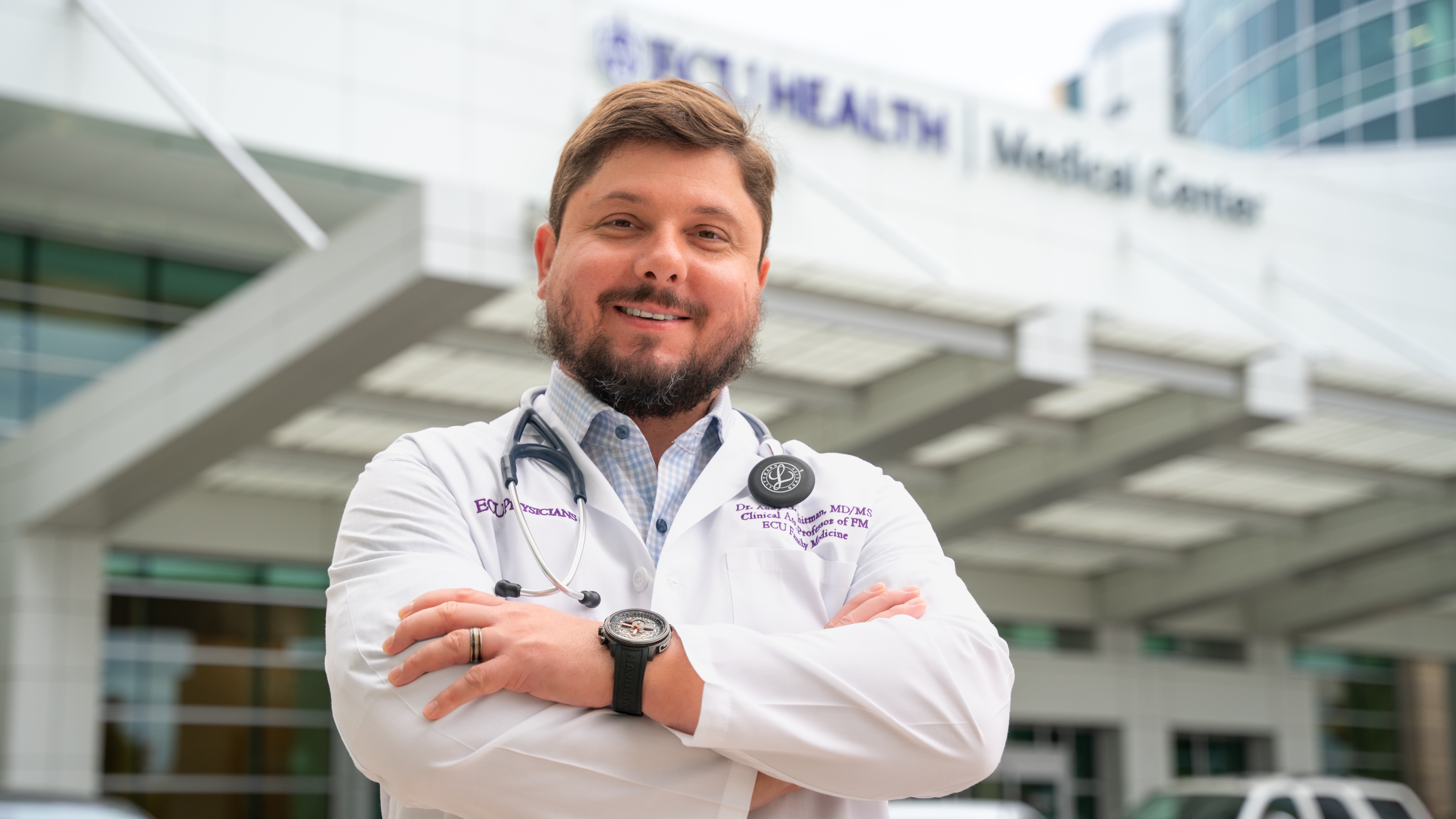
“Rural health care is under duress, and our rural communities need solutions,” said Dr. Michael Waldrum, ECU Health CEO and dean of the Brody School of Medicine. “The Rural Family Medicine Residency Program is another great example of ECU Health and Brody understanding what the community needs are and creating new pathways to educate physicians to meet the community’s needs and improve the health and well-being of those communities.”
Setting a path forward
After Dr. Whitman was approached to create and administer the program, things moved quickly. A “national guru for all things family medicine” made a visit to eastern North Carolina to consider the best locations for residents to begin their rural training. Dr. Whitman and team reached out to other universities and health systems with established programs and traveled to learn about rural organization structure and rural curriculum best practices. Two years later, the Rural Family Medicine Residency Program had its first cohort ready for training.
The first year of the program features training at ECU Health Medical Center, a Level I Trauma Center, and helps set the residents up for success when they get to the rural environments in their second year.
“Anything and everything you can imagine seeing in residency training, you’re going to see at the medical center,” Dr. Whitman said. “We provide this very intense, inpatient-heavy first-year experience for these rural residents where they get to see really sick, really complicated patients with lots of resources at their disposal so they can learn how to take care of these really complicated patients. After their first year of training, when they’ve taken all of these lessons learned, they can go out into these rural communities and apply those lessons learned where they’re the only show in town.”
Dr. Whitman added that while Greenville and eastern North Carolina are rural, the more than 1.4 million patients served through the ECU Health system creates a high volume of patients at ECU Health Medical Center, and the exposure to so many patients during their training is also hugely beneficial for the rural residents.
“An institution like ECU Health boasts a 974 bed, Level I academic medical center where residents train alongside some of the best and brightest health care minds in the state,” said Dr. Jason Higginson, executive dean at Brody. “Medical residents can then serve in our more rural hospitals to apply that knowledge to underserved populations, building a connection to the community in which they serve and making a real difference in the lives of patients.”
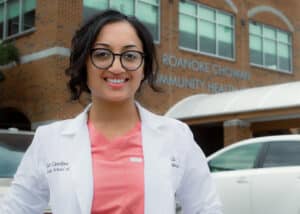
Dr. Zeel Shah
Drs. Zeel Shah and Jim Jaralene Porquez are part of the inaugural cohort for rural family medicine residents. Dr. Shah practices and trains at Roanoke-Chowan Community Health Center in Ahoskie and Dr. Porquez at Goshen Medical Center in Beulaville, both of which are Federally Qualified Health Centers (FQHC) that serve at-risk and underserved rural populations. The mission and vision of these FQHC organizations align with the mission and vision of ECU Health. Together, they seek to augment scarce health care resources in rural communities, improve the health metrics of the communities they serve, and encourage the residents that train in these rural communities to establish roots and continue serving these rural communities after graduation from their residency training program.
Dr. Shah said the year in Greenville was a great experience before continuing her residency training with a focus on serving the rural community of Ahoskie.
“In Greenville you have a lot of resources, but it’s a learning curve to rotate through the different specialties,” Dr. Shah said. “In Ahoskie, the challenges are different. Social determinants of health care, such as finances and distance, play a significant role, and you don’t have the same resources. You learn quite a lot about how to make your limited resources go a long way by relying on creative strategies while using medical expertise you picked up in Greenville.”
Now, as third year residents, Drs. Shah and Porquez feel established in their respective communities and have built trusting relationships with patients, families and fellow team members. Both said the community aspect and truly knowing their patients are among the most rewarding parts of their rural experience. For Dr. Porquez, feeling love, trust and appreciation from her patients has made her time in Duplin County special and a place that she plans to call home after her residency.
“What really drew me into my community clinic in Duplin County specifically, is that my patients are very appreciative of what I do for them,” Dr. Porquez said. “They care so much about my time, my effort and my expertise, and I think in just a couple of years I have built that strong trust and relationship with them. I feel like I don’t just treat them with their disease, but I go further than that. I treat them as a whole, and I get to know their whole well-being. I see them as a whole person and not just the disease that I treat.”
Early milestones

Dr. Jim Jaralene Porquez
For Drs. Shah and Porquez, the personal connections built through the program are so strong that both have decided to practice in eastern North Carolina following the completion of the program in 2024. Their graduation, along with the other residents in the first cohort, will represent a significant milestone in the program’s short history and help ensure rural communities have access to specially trained, high-quality rural family medicine providers.
Dr. Whitman said he’s proud to see two members of the first cohort choose to stay and make a difference in communities like the one in which he was raised. The successful launch has the team thinking bigger for the program, and recruitment for the next cohort, featuring a new site and more residents, is underway. The Roanoke Rapids area will benefit from the program and begin seeing its first residents from the program in 2024, and the program in general will grow from its current size of 10 residents to a total of 27 residents over the next three years.
“Moving forward, I see nothing but growth for us,” Dr. Whitman said. “We are truly doing mission-driven work and trying to bridge the chasm of health care disparities of urban centers and rural areas here in North Carolina.”
Dr. Waldrum agreed and said he sees the program as the beginning of something special for eastern North Carolina and rural medicine.
“My hope is that we can take the knowledge gained through the Rural Family Medicine Residency Program and apply those lessons towards other specialized clinical areas of expertise in the near future,” Dr. Waldrum said. “We are proving that we can be highly successful in creating rural residency tracks and our historic success training rural providers who go on to practice here in North Carolina is a further testament of our ability to create unique solutions that meet the needs of those we serve.”
Resources
Greenville, N.C. – Coastal Plains Network improved care for more than 27,000 Medicare beneficiaries in eastern North Carolina and saved Medicare $13,220,162 by meeting quality and cost goals in 2022, according to recently released performance data from The Centers for Medicare & Medicaid Services (CMS). Coastal Plains Network consisted of ECU Health clinics and hospitals as well as Rural Health Group during the performance period.
As a Shared Savings Program Accountable Care Organization (ACO), the Coastal Plains Network – a company founded by ECU Health – reached a record number of savings and earnings in 2022. ACOs are groups of doctors, hospitals, and other health care providers who decide to collaborate and provide coordinated, high-quality care to people with Medicare. Under this collaboration, patients are less likely to need repeat medical tests or unnecessary medical services, have extra help managing chronic diseases, more preventative health services, additional recovery support when coming home from the hospital and care in more convenient ways such as home-based care or telehealth services.

When an ACO succeeds in both delivering high-quality care and spending health care dollars more wisely, the ACO may be eligible to share in the savings it achieves for the Medicare program, also known as performance payments. The Coastal Plains Network received more than $5 million from CMS to invest in improving patient care and outcomes.
“ECU Health and the Coastal Plains Network are proud of the providers who helped bring record savings to the Shared Savings Program, which improves the quality of care, care coordination, accessibility and lowers health care costs for Medicare recipients,” said Todd Hickey, chief strategy officer, ECU Health. “With the savings, ECU Health plans to reinvest in population health efforts aligned with our mission to improve the health and well-being of eastern North Carolina.”
Patients enrolled in the Medicare Shared Savings Program see lower out-of-pocket spending on avoidable health care utilization like emergency department visits because the ACO has better coordinated their care.
“The Medicare Shared Savings Program helps millions of people with Medicare experience coordinated health care while also reducing costs for the Medicare program,” said CMS Administrator Chiquita Brooks-LaSure. “CMS will continue to improve the program, and it is exciting to see that Accountable Care Organizations are continuing to be successful in delivering coordinated, high-quality, affordable, equitable, person-centered care.”
The Medicare Shared Savings Program saved Medicare $1.8 billion in 2022 compared to spending targets for the year. This marks the sixth consecutive year the program has generated overall savings and high-quality performance results. This represents the second-highest annual savings accrued for Medicare since the program’s inception more than ten years ago.
“We are encouraged and inspired by six consecutive years of savings and high-quality care, with 2022 being one of the strongest years of performance to date,” said Meena Seshamani, MD, PhD, CMS Deputy Administrator and Director of the Center for Medicare. “The Shared Savings Program is Medicare’s permanent, flagship Accountable Care Program, and we look forward to continually improving and growing the program, expanding the reach of participating ACOs, and addressing critical health disparities across the country.”
In recognition of Veterans Day, ECU Health’s nine hospitals across eastern North Carolina took a moment to come together at 9:05 a.m. Thursday to recite the Pledge of Allegiance and recognize the service and sacrifice of those that have served in the United States military.
The events across the system recognized more than 500 Veteran and active-duty team members at ECU Health, along with the many Veterans at the Brody School of Medicine at East Carolina University.
At ECU Health Medical Center, Veteran team members, spouses and team members at-large gathered around the flag pole in front of the hospital to reflect and celebrate.
The ceremony included a moment of silence and reflection, as well as a roll call for each branch of the military. ECU Health Chief Operating Officer and ECU Health Medical Center President Brian Floyd shared remarks during the event and said it’s an honor to work with Veterans who choose to continue their life of service in health care.
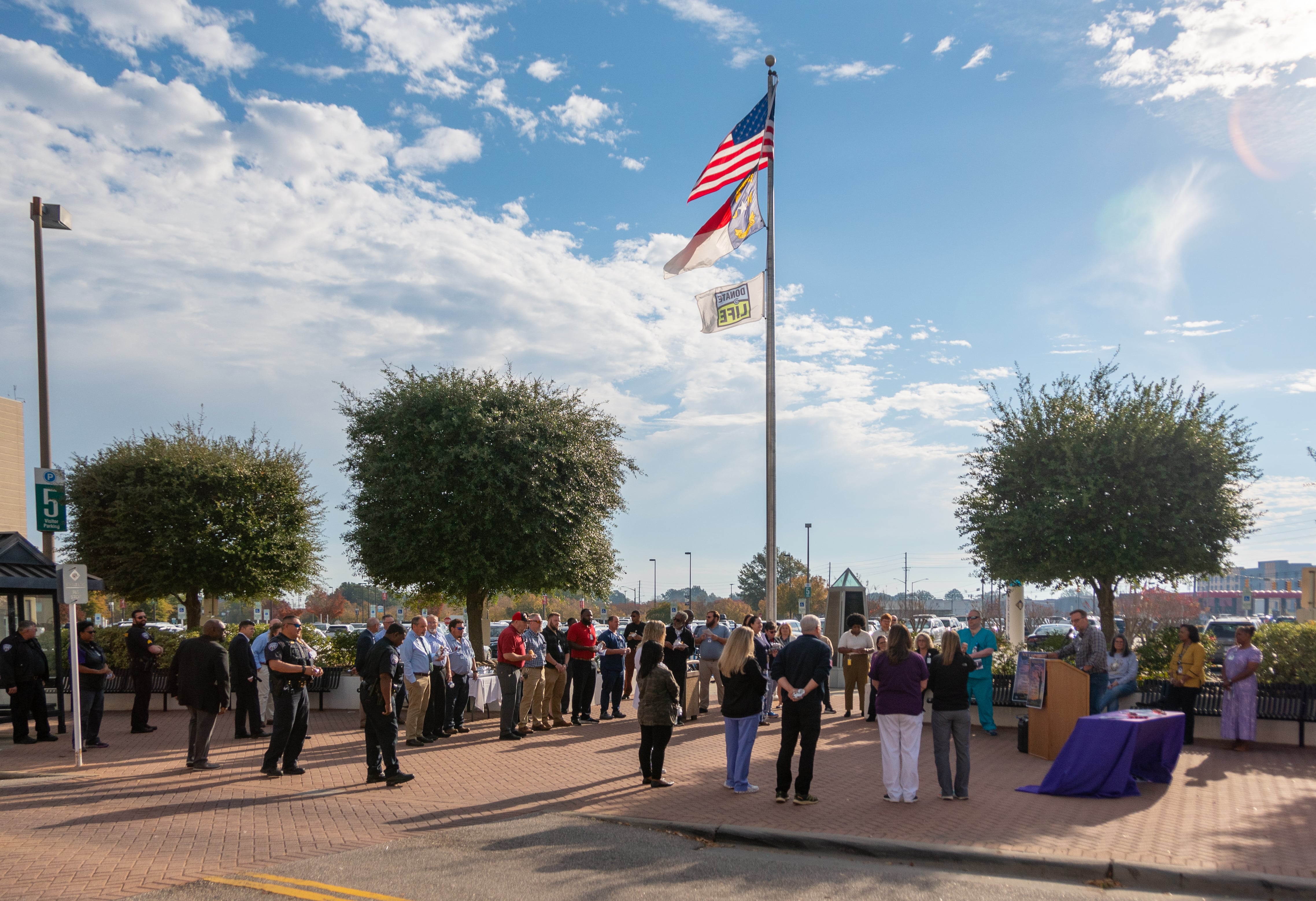
“When we say thank you, we say thank you for your service then, but we’re really saying thank you for caring enough to serve, for being willing to give your life in service to something bigger than you,” Floyd said, “evidenced by the fact that you served in the military, then you chose to come to Greenville, North Carolina at ECU Health and continue to serve the needs of others.”
Dr. Tim Weiner, pediatric surgeon and Surgeon-in-Chief at Maynard Children’s Hospital, served in the Navy as a Commander and retired from the military in 2019. He said the event was a great opportunity to recognize what it means to give your life to service, both in the military and in health care.
“I’m a service-oriented person, the institution is as well and I think it’s very important to focus on something bigger than yourself and this event commemorates that,” Dr. Weiner said. “We have to look beyond ourselves and share the gifts and talents we have. The mission of ECU Health really aligns with that personal ethic for me.”
Army services prepares flight nurse for time with EastCare
Paul Johnson, flight nurse with EastCare at ECU Health, joined the Army as he’d always dreamed and served as an airborne infantryman. He said his time in the military prepared him for his role as a flight nurse.
Johnson’s teams have always been first on the scene, from his time as a paratrooper to his current role in EastCare. He said it’s a position he’s learned to thrive off of and embrace.
“The Army taught me to continue functioning under stress. To be successful and to make sure that patient has a good outcome, you have to focus on the task,” Johnson said. “You have to maintain focus on the patient, just like in the Army you have to maintain focus on the task, on the situation. That has helped me a lot.”
After his time in the Army, Johnson went to school and began working at ECU Health Medical Center as a nurse in the Medical Intensive Care Unit. There, he said, he learned from many mentors how to be a great nurse before he transitioned to his current role as a flight nurse.
In gratitude
ECU Health would like to extend a heartfelt thank you to our Veteran team members and all Veterans for their service to our country.
Each Halloween, patients, families and team members at Maynard Children’s Hospital at ECU Health Medical Center get a chance to break away and enjoy the holiday.
Parade floats from team members and community groups flowed by the Children’s Hospital on Halloween afternoon, giving the children a chance to see some of their favorite characters, like Barbie and Ken, Minions, and floats from Toy Story, Trolls and Encanto. Even the Mystery Machine, a Jeep full of sharks and a pirate ship appeared – all to help make the day a little brighter for the youngest patients at ECU Health Medical Center.
Amanda Jones, a child life specialist at Maynard Children’s Hospital, said there is always a lot of planning that goes into the event, but it’s worth it each year to give the children something to look forward to during the holiday.
“This is a really fun event where they can still celebrate Halloween even while they’re here at the hospital,” Jones said. “It allows kids to be kinds while they’re in the hospital. It’s something that they would normally be doing if they weren’t in the hospital so it kind of brings a little bit of that holiday spirit to the event here.”
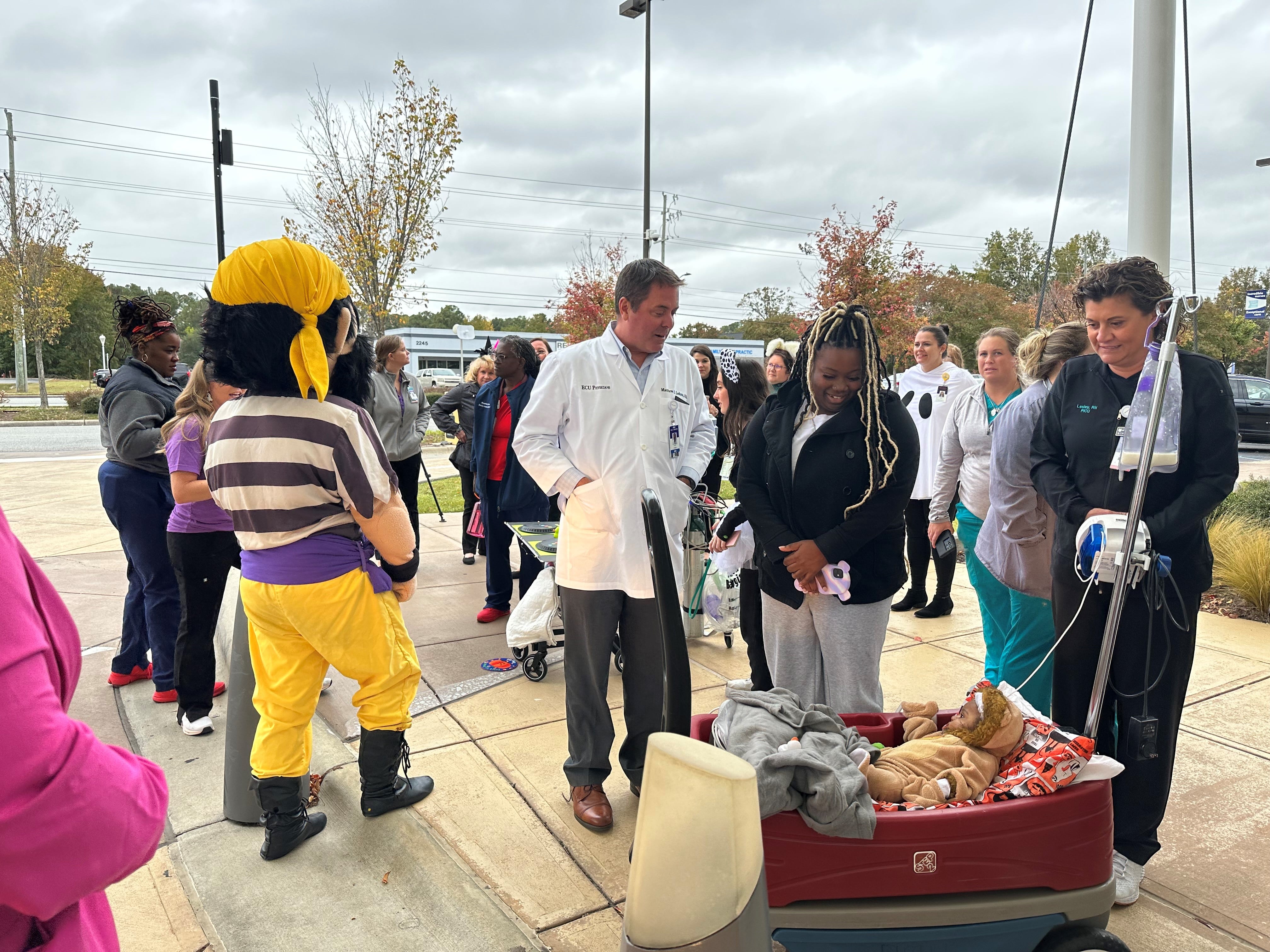
For parents, it can also bring a source of comfort. Angela Blanton’s 8-year-old son, Chance, is a patient at the Maynard Children’s Hospital and has a rare condition called Walker-Warburg Syndrome. Blanton said Chance could not be outside for the event, but she still wanted to celebrate Halloween – her son’s favorite holiday – while at the hospital.
She shared photos of past Halloween costume contests he had won and reflected on what this event meant for her. She wore an inflatable chicken costume, worn earlier this month at a Halloween party with her son dressed as Colonel Sanders.
“He would love to be down here, but he can’t be. So I think it’s amazing for the all the children that can be here,” Blanton said. “Seeing them light up, and even me, in this silly costume. Some of the kids wanted to take a picture with me, and I thought that was awesome. To see the smiles from the kids and parents and know how important it is for everyone. Not just the children, but the moms who have been there by the bedside.”
She shared that these events mean a great deal to the patients and families looking for a piece of normalcy in a challenging time.
Patients across the hospital receive goodie bags with art supplies and toys after the event, whether or not they could come. Jones said the event is important for team members
“This is a great event for team members that participate in the parade and for those that come out and watch it,” Jones said. “It’s enjoyable to be able to step away from the bedside and spend time with patients on events like this. I think it’s really uplifting for everyone.”
Ahoskie, N.C. – ECU Health Roanoke-Chowan Hospital hosted a community celebration Tuesday to proudly commemorate 75 years of dedicated service to eastern North Carolina.
Established in 1948, the hospital is dedicated to providing exceptional health care services to its community and has expanded and evolved to meet the changing health care needs of the region.
“We are immensely proud to celebrate 75 years of serving our community,” said Brian Harvill, president, ECU Health Roanoke-Chowan. “Throughout the years, we have strived to provide high-quality health care services with a patient-centered approach. Our commitment to excellence and compassionate care for our community has been the driving force behind our success and continues to positively impact those we are proud to serve.”
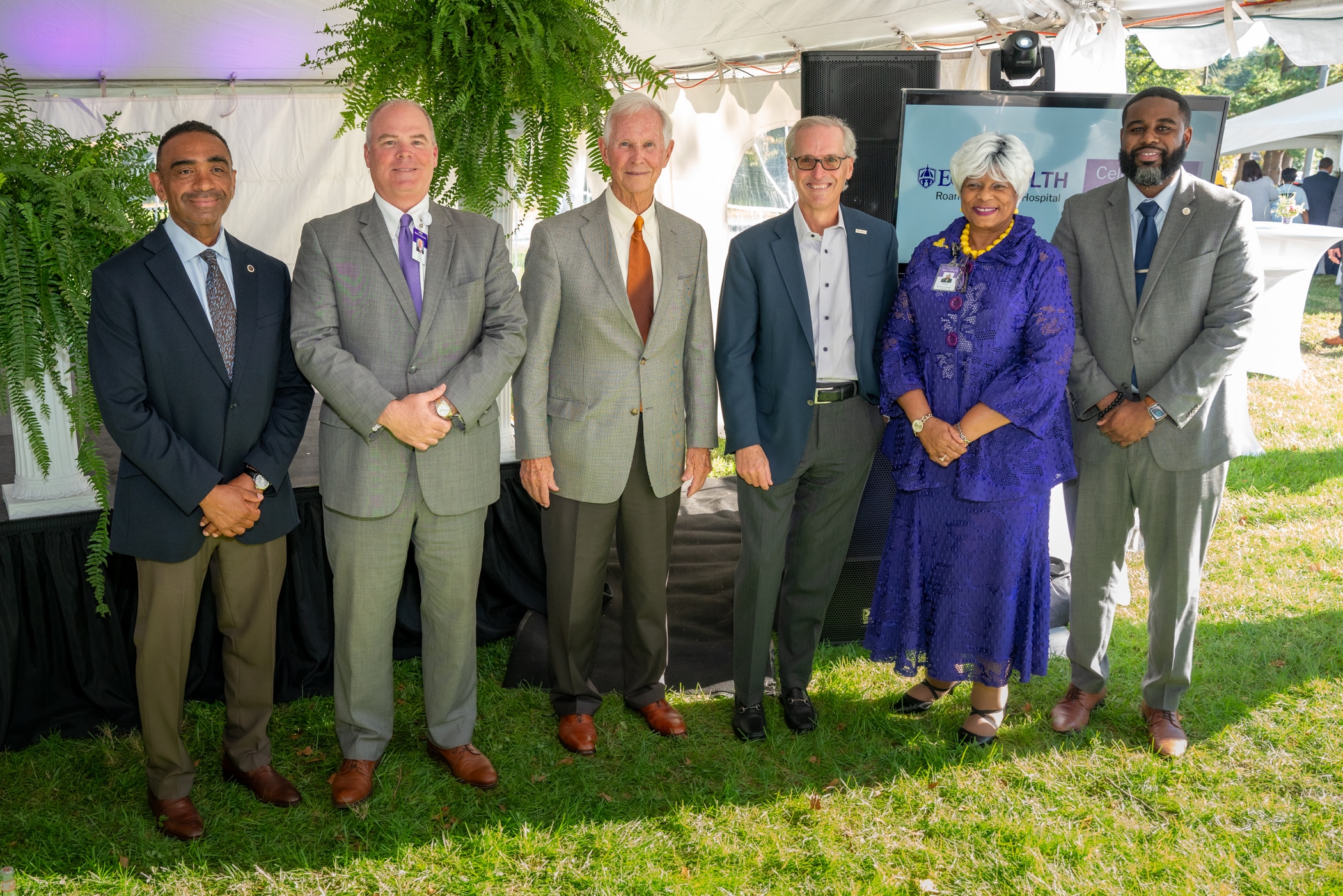
Situated in Ahoskie, this 114-bed hospital has been a cornerstone of health care, offering comprehensive services to nearly 40,000 residents spanning Hertford, Bertie, Northampton, and Gates counties. ECU Health Roanoke-Chowan Hospital offers a number of specialty services, including behavioral health, cancer care, pain management, wound healing, sleep services, pediatric asthma management and an ECU Health Wellness Center location in Ahoskie. The pediatric asthma program at ECU Health Roanoke-Chowan Hospital helps children in Hertford and Northampton counties miss fewer days of school, participate more fully in physical activities and look forward to a brighter future.
“Over the past 75 years, ECU Health Roanoke-Chowan has been dedicated to providing exceptional health care services, and this milestone marks a testament to its unwavering commitment to the well-being of the community it serves,” said Jay Briley, president of ECU Health Community Hospitals. “These achievements reflect the hospital’s dedication to improving the overall health and well-being of the community. Today is a day to celebrate the contributions of our current team members and those that came before them to help build a legacy of quality, compassionate care.”
Since its founding in 1948, ECU Health Roanoke-Chowan Hospital has continuously evolved to meet the changing health care needs of the community. On Oct. 24, 1948, the original 40-bed hospital celebrated with a community open house, officially welcoming patients on Nov. 1, 1948. ECU Health Roanoke-Chowan Hospital holds the distinction of being the first hospital licensed by the Medical Care Commission, still bearing license number 1, marking it as the first hospital in the nation constructed using federal funds provided by the Hill-Burton Act. In 1952, the facility expanded with the addition of its first wing, accommodating 25 additional beds, followed by another 34-bed expansion. By 1975, an extra 50 beds, 10 intensive care units and a third floor were added. In response to the growing community’s needs, the original structure was replaced, culminating in the dedication of the present-day hospital in 1992.
“As we celebrate 75 years of service, our hospital’s commitment to clinical excellence remains unwavering,” said Dr. David Lingle, chief of staff, surgeon, ECU Health Roanoke-Chowan. “Our legacy is built on a foundation of dedicated health care professionals who continuously strive to reach the highest standards of care, ensuring that every patient receives the best possible treatment, and making each year better than the last. It is an honor to serve alongside such a great team of professionals.”
ECU Health Roanoke-Chowan has achieved numerous milestones throughout its journey, including recertification as a primary stroke center by The Joint Commission and the American Heart Association/American Stroke Association, Get with the Guidelines – Stroke Gold Plus with Target: Type 2 Diabetes Honor Roll and earning accreditation by the American College of Surgeons Commission on Cancer as a Community Cancer Program.
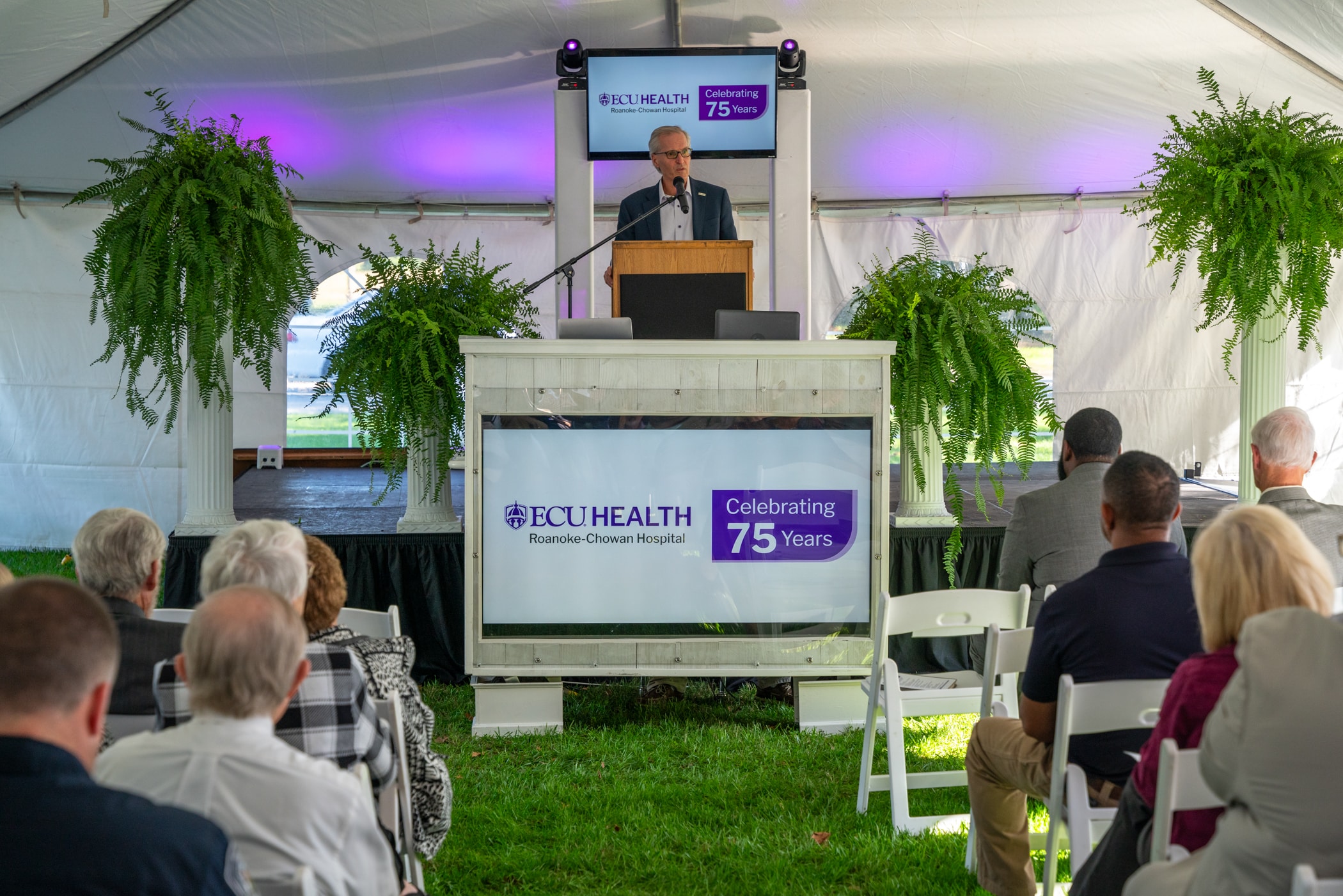
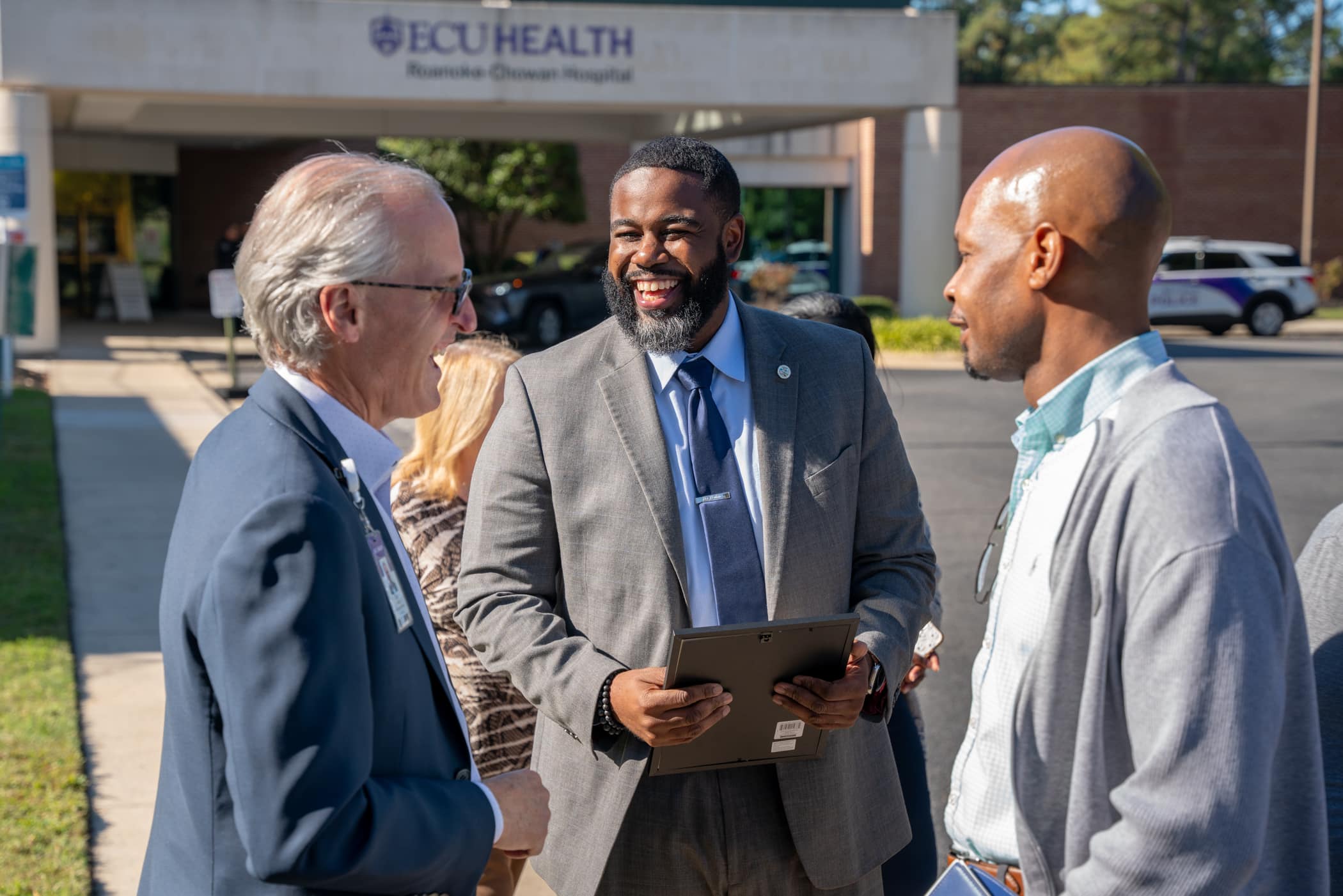
Greenville, N.C. – Members of the U.S. House Committee on Ways and Means visited Beaufort and Pitt counties Monday, Oct. 16, 2023, to engage with the community, tour ECU Health Beaufort Hospital and ECU Health Medical Center, hear from community care leaders and discuss the challenges facing rural health care in America. The committee visit consisted of Rep. Greg Murphy, Chairman Jason Smith, and Reps. Adrian Smith, Kevin Hern, and Claudia Tenney.
“Whether it’s in my home state of Missouri or eastern North Carolina, rural communities are facing a health care crisis,” Chairman Smith said. “Today we heard from health care providers and local leaders about the struggles their communities face ranging from patients traveling long distances to receive emergency care to health facilities finding and keeping a quality health care workforce with the scarce resources available. On our current path, access to health care for a huge portion of America will continue to erode, putting the health of millions more rural Americans at risk. The Ways and Means Committee will take what we learned today from patients and doctors on the frontlines of this crisis and use it to inform the best way to expand access to health care in rural communities.”

Committee members and county leaders started the day by visiting Belhaven before touring ECU Health Beaufort Hospital, built in 1957 under the Hill-Burton Act that provided federal funding to support rural hospitals. There, committee members joined a roundtable conversation with ECU Health leaders and Beaufort County community leaders about the importance of finding collaborative solutions to the complex rural health care challenge.
The day concluded with committee members visiting ECU Health Medical Center in Greenville, a state-of-the-art academic facility that delivers high-level care to residents of eastern North Carolina. ECU Health Medical Center is the only Level I trauma center east of Raleigh, showcasing ECU Health’s unique system of care that serves as a national model for providing high-quality rural health care.
“Chairman Smith has been gracious enough to organize field hearings in the country this year on various issues,” said Rep. Murphy. “I am glad to have him and other members of the Ways and Means Committee spend time in eastern North Carolina to look at rural health care. We had the opportunity to witness firsthand the efforts of clinicians striving for quality in medicine while ensuring access to care for all.”
Throughout the tours, lawmakers walked through the emergency departments, intensive care units and labor and delivery units and engaged in conversations with clinicians regarding the challenges faced by rural health care, the aging infrastructure and the difficulties associated with sustaining essential services. Leaders discussed the importance of preserving services such as labor and delivery units within ECU Health, which are a lifeline for expectant mothers, providing essential access to safe and skilled maternity care, often in regions where other health care options are limited. Maintaining units like these ensures that rural families do not have to endure the significant burden of traveling long distances to access critical services.
“ECU Health has long advocated for solutions at the state and national level to combat the intensifying rural health care crisis facing America,” said Dr. Michael Waldrum, ECU Health CEO and dean of the Brody School of Medicine at East Carolina University. “We are pleased legislators not only recognize the need to explore solutions to maintain rural health care, but also recognize ECU Health as a leading voice on this important topic. The visit to Beaufort County and Greenville gave us an opportunity to show our mission in action, and we are deeply appreciative of the committee for spending time with us discussing rural health care.”
![§êÌ4 VYz½5Ñkã$¿òq³'Ô[¢veÐÆï¤DB³§ÍÐW28ø`Ò1ñMçÚíäuÓ@£CND£1-æ!^ÆÞkÝõW_N1´c§¨kO½Fa îÒú4¶
æÒÉöµTñÕx|9d!ÞÊ"Q¸m^ÚNmtx9* ô" NÙ$ßáÝ£MG*ðn@Ò|NÎ9*º··¿e´Jy¿#@ÁAb+ïLÇÕ
Q2¼×Íú3AtÆÅY-áªÛíäøåXynÇ4wÙ :üñÆ©RGFVé_[á¡ÿÖU¿.`tæ0ñ_ã,KÏ|ýes§kQiz|+Ís=NåØòýe$M'KÐN5YÒ;pL¬~Ñ¥@Rx|Ãåv9;(ãl£ÈúGÔ4·´îK V«/"U·§ÚæX.¼H¶ÑóRêYAøØ(B3Õ¸DÈÈö¦Y×$nåXøÅs&V(±)SRkkdI¤M*H
Y~t#¶S>lâU~¦é**Àl<r²È1åó74ëK{(áµAgÉÞI#äKP¨¯*{e' %Ø)æõK3ë[Å2TW&Ë!H¥Ó¦Iã¡Ûy?æºÍ¯ssÉé7²¸åô×12`â2ý.F<ÕQ®lf/0k¯ª=^2Æ1â(ÁJyoϦðÀ7|C³ H_ILE׿ßùæ®bÛwK¢ó&¿q¨Maos@HqÀµ7© wË#K)ÄsD¿4-ÊÅqºìyãZmCL£µn±%½²9-ÌOõÈXM"ó(Ì8üPTøä±â]"cÓv/uí[ñ¡ã¦Ï(wjPWímøµä¹³Ý¥^ZEÁÓþ59dy|ÃmF=9d/ á@Ì:åpÕBÏÙ.ÒîmfÄûàZC-ÅØ°4?:ò²L)ÛÉþ!¢ãÐõÉHòoÅV:°??*VNÎÐ+w5¦dc<L3a1×µ{ÚÎÚ^ÚÔBÑÆܨ§L8¨nQÕOÿ×}ªß}pZâQ³ÇǹíPs:ZQÍ×EkÚJùÙ3z(0Iô
M[5ú%#¨èÊL6s#[м¤Íyk4ìÆBÒ¸æv¨SÄ~2áË+>l
lW¾Q -õ86)Z£ü¬¤@ÓÂq£ ]>":¬¯O dOÔËøS¨£BMk½r¹óH^a^2²Ì0^ÿêZúÁY7§"§ÃžéBzµÓÆC·Ãb°´
!»D v éDP§]2L(¥d.ôÅ:b~bÚÂöWìT3#Eĸ5^FbæêÛêkß-i1ÝÁYçXÌãÈ19D£éG¥dN¹M6Çt8y¾ýiMäýiXóý!Óº°%'â|ÎÁ¢Ã&´F< ñú¢ÇµKÍBö[Û빺ÕåsSOࣲ¯Â¹¶§TM¥RÆÖ¬~d%ij'ùÒÎÅô ¾e·6!Uû@þñsW³±cþ:çÃ_¿ø¤ÃT×5mPúß¹Cö6áÑÛ½ßÿÐù×ÍóhÓ[gPyË)ÐúÍL<l[ϯ/äÔ¦ÊUfÚGU new)é~MÊÚ¬m7Z!ÏÕy]ÆXzwâ5ªÊëýâ·üy@â!»e9̼bº|iäãõÐÊyDÛmºäLX6HÛdU%~½Ì~¬ZäiØ-{M'êÈ©ð§l²/~¹ sHyGæuÓWz=
ÙÚ0#ýÐÉãñÿkíxdKt");ü°o0i×Zl³Q¬]f?ÅDí·óWøå"¨R¢l$×þqÔtZîæ-FHÄ=O#BKMò¹nYOMò®uÝ'N¼Bfæ[yÈ'º'¦Ôʧµ2wég]°´°_?¥tÍHÿëLÇÏȳÃõ=Ç×t8S¬Tñôù-GÏ*#Ò@ÛÚÿ¤ÇQ±9PíìÁou]#Í׳TG$íâ+ñ7WîËñs,rdÐOÝÔsÄA¢R¬;G5]¶lEÉìáÍ¥²^^ê6²AÊÆÖ{¾U$ÙÄdÿ¨9¾ÿðþ|ÞvV qKù¡ÂÖd1vðÌ¿6y£Ì`êºMª´è#û*йR9þÏÚ9N ¾g_¡ùßTÒì¿@ÉtÇC¸9&½ í$uû ûÅû-ö¾×Ú®Pú¬"Ãmæ©5·ú«pEÎ0 !¤PXÐ|&µ4Z¸GL¤G¿Ódñý êÞe·]fÓHk«K{%#-ÁûM²9NÑâ þ&P÷2þkÐuÏ?ÛùGË$EgÕf-´/Ñ@3IàgöÛáÍîÜéòß5y_[ÛëËÉîòåÜ]ÊwbRÿ*Ï4nÓÏ&ù¿UÓR[b7¸²°lĸ|~8öÿegJ% zd£/úªzæ&³®ÌI_®?ÝEö#E²*ñí¶npÆPu9 <ÒöÔç/kX×õÈi'®VY
rTÔ¬²O4]JVs m¨¯b3(mÆ_ÿÑåk¹kú3o¬Ê½Ê/à¹3r%¢á1ëPûäJSXG)=;0MÞÇ¢Î2169«ùkÏ6÷¢ÂjÆöÞVäÔGï,2/òÇ!@ÿ³pÊ"AÿU¿)<@sú¿£'¡¸øÌ°ÃrJëjAgb''¹sePyfho&UÒåNcýzdIl«j]§ þ¤ò?v¦U(KFëÆ´È Ý_1ëz§¯æI§äY¥jíË érFÛ3ïÉ]yí<ÙqjÌU.m%§J£ÐýcæÃ''j¼qÉ3ÊJÈ*»Ðnj2¶W³Ù¿ 59[OôxîZdcÝÌ,¦Ô^°¼P¼Rº?kß+¶MÄyÿµ}?êÚ6U ©âMTÐ7NlÄ=a1E·¦1ÖËñȤ'øÊj«21ØR}dy<§Í0¥Ï%Inn¹óÓ ÔaRúC%7vZU·`ÖX+ƵÜBv&¯íG)#ÎRámÒKJG¢Où»æ?ðç,¼±jôÔu gÔåhÆw¿ñþ?ßIN,CDG(U)#üO~æå!v â³¹½K6ÀrM22KÖüÑ®7¼¥mgæB.,Èôû}£OòóAæsþO«úÓþÿÅ;èfü®aûÌÓÿþkÉ }BíaæÅ¥5RI ~ÓÖ¿ñ¶n¡Ø:9HgrÉ5/0ÞjS¸WÄ«yI(¿«2âE²m*FkÈ@·@ÝkC@©u±fåÍ!äyÂþÏß×.Ä:µä^¯Z3 4JH{o1TRyr¹3~¦ùYJe¤Üà«/&ÈsÿÒämhíµíGn6Þ»èd!,Ì DÓ îJUþ$G¾?²N¶ÐôÛ/£[¹Ü@2Àñ5ëÓ+ÈLbHæÛRòzoéÛh,Ù[E¼GuaÌF*9n¨JýVî¥Âù´ô#_ë×zÚö»h°ÔÓ-@!äã,ªßgû)Ù6åÑÕ@ ú²'ÝCõ ò1ã²w^JÈ´æÐõß=LçFF·ë¶ñ7ôã§Âð?Õ=2AÇ1=ÌfòfPú£±øO,³HÝñÈÖϵm{=] ¿S£hÜIý ¶ea¸#(É®©¯®å²óN¬CuFKi:·ÝÎÌsLÐX[Üë%Y-TÕ·:t+[>÷»þKy'_Ó§Z»·úµ¥Ýej£*üÕyW¦bd³0z/ãRñJÓ]²ËqX極½ÕêHÿ^¡PH*½ËNê;æ6|qÜõoÅVDÑB&Ï¡hã$vÙwýx"}!¢²qá
'¬ú^#öÑzÄóÎEÎ/.iÖ1$)ªjÖÑÜøu¬Z©,Q9D¿ÿH±Í2 Gó)ç¯5Mæ8_êåÕKzzvñ|1ö{ÉþÏ6½@ů¤hÚ-÷,?^ ¤2![[ÜyÒk&{ÆZs¢ÔììþÇ(ÕÈf>W§ênÓ@þêUæM[Qó6½uyRÝ "B)!öKÇo)Ãbn«Ps϶þÿ6*hvü»ßónfâ»U6¶y;ÌÄÉÛlº,/J·YaY@6ñ¸%HûmMþjË!#äÆR
Ô$+HòDýOðÌE«Çs°ñ$ÒÒµ½ÈuÛ%Ú%V,iQ÷ä¢Ç*,ÂÞ[åd²Ltuå3V{ääÙoÿÓåÿvù¥½9%¼ZtõQ¿98µF|DéË)Zw]ËdÂÓPT´¼©$knÿËûÀdéOµW%Å|ÑîDé÷$I$ÇÐiJ¡9ƽía[¤Ì}aç¼Ñæ·µyM±;"6<ùÄÒHåðû´ÿdßäãÆ@:Ä·äÆb"zLqEª@§P¸QÈ;(è;3×æË ÐèqDâ! õH^gþz?õÌÌdþqsÍ÷eMîé{NÌÛÈ^hòõç ±Ò¹ÓY-æâÄHÊUç@fõQþ3c$-F'@Éy×Ìi¬ù½(âT².!RuST¯Òî}>ÖdÝ$7_(9Bhm¢®«ûÔÜéQ±ÉÒ D¼L>Ì®>ãúÆ ¼cóÿZý©yX»ótîußh} vÿ*UÌ}Dµæ;%!XȽ=mðÛN/,í#´hï8þÔv?~eÄp¹HÜL!´¦¸zásA]éóÊçà ó§ïü·æy4[×æÐÃÄÒ£àOÿ¢ËP°$`ÙrUÙëÜ(¥®LÂÎùYdè*Û8#½øóݲ/ÿÔäs×#Öõ»R(M¼s¤Aab ^(î=Æg4F$ØܱñqEì+÷bè«JiÀñZÓ¬¿ËRÛêw:mêÒé²YÚÌ×/»TzËéDárR>>¹®Ê9JGéÙÂG68cV>/ô¿ÂõA>:Èéy%ÅÇr`hÔ°©'lÐë! HÏð»)"#ÃÉ'ó]ü¯} (T·/³ÛlÂÓâGúÎNrx¹çþOý";fë[ÁᯱÕi¼QvüÁ¹ºW+úZmØøåý,'úÍ*Ê?ªÁ^Y§y%K$ z£áOPñ^Göy6EÕݧ>Y§ÖôÛZFææy4`8F§_Ùm± E¦£O´t«H¬tûk(+hÒ$g5b¨(*E3Zåpm°¡á¿~m¸ÈË4ëéÙ^)üFbäæ¬DÐzÑ®nUA:Ð$ïL9QR¶Ôɧ#jýù2¤'"@êèp0ÿç!tÍOVóMÕcåm¤i]ÝÊkÅ¿*WùØGð®ei2ñçÑZþÕ>{æÀqÐ>lXH¬vNCY´=bÏC×µ©àhíÁdF^_"W°âE>#_ÙûY9ÇüN~r<RûW§þ%ÝÌW)ɨÿ¦ì;ì¤C$G%{¥»±3DI¡¹òYÇäVjx1»¶2;&zµåO©Z©ÝHÞ¹<»53/ʨ[éZÏîxÇueÊ8¥xÀ1Ú²}øÁ2$Û³ÒDQ=ÌG_×õ1jÒëz³î.(¾+Â5éð 9±Çºu*¢Ó¸ãï±1S»·¾<ÒwÀT4ªYÀI¦S&qe¤PD!or@Ìkm§ÿÕás3Mé§Pîݼ>YcZáCLiWðä¤c%£òÓK¿´óïjðúð³Bd]N%OLÑöQ,fñ;®ÎÅ(dõôþ§§Ä@yþqÿÐϽÊf¶+μüknz·~-gbÜëÐó=®}þhý*:^OË¿0_ºÊoC8ªG§HTl]å2o$ÿ7ýóÅB¿¥ùsgëù»AE&ò'úó?äô¢?Sëø[á_Í;l(ycµ¹óôn¼I¤©îadúË>¦4`íiv¸1²ÍÀ1âM:áD¥FÂÑ'Õ¥ÃÛjc1ljÂ|²y¤z"0e4øR85 %T¡å_ø.Y9©³.£®ôýYE5¼Ñ´¡KsP¿:Ó24Ó¾Y¡=jSóD7ÓiãI¸æÝÌ|3éµý-×ífôån´@Ý=3Eü²Ó,4M4kÞ¡kÎW?²¯+eÿ)TÚÌs+-£ÌÎ/ÊrýÚ_(Å1ëéûÿÅñ³æk(Ë]ÄÒRõíã'Svcæh CËô Æ×Ì·Ýbâ¤Ò´®ù Ù#`º+yáÛd²2¼áÒ, ¯×½3/Í¢ye úK^¦7Åuùx_sA7ï`0%¹lGHÄ(%a{Éô/ééd·ImÉHV@ݺ×ÍiW2ÔQó{HÞ@!?ݳ%¯bGÅ2Ë+ÙÉ8õJnü¹u<wRFn¥5=iO÷êÌØrMô[hÕj{dk#uÑùqCWÕð8miº@nÿÆÑH{Í.që+Ô+Jÿíeº©_¥§nc?t?KÑ ´º½=ÁäHOÊÓýÕÂYü<RÿsêvØ2pcâû¿CåéA©H¿³îµöW#7úÑAf·ÛxÌÁ Âäxûk_Ãa´.28uEAðømúï%<äú
$N.:2î§øØqVÅÄ«Ý¢@hõelÁMc©)ZSz|ò5Ñ<][1
ÆjOÉDéïéÎÓÇÄÄÈvo#¡äFÃáÐÿÿ×ä_òBbÕ?+}Ê¿Epê
ÀÓ¡ dæOé=ìïð BÈäxþ×NMKUAÄw`¨ I=®òX£t^ÞKYï,n-àhd'E%ÜËÖ¹Xª'ȳÈéGï{o=ózÀT¢÷¬?â+Ù+á«ó9Qí`½¶y²×z#<§ÍnüÏtõ·Ä¦µ@~ë4c}Ï/¬7WË~ÓþP¶xtØát1²ÆëÄYµþ®ÔúOOõGêÌ#ÉÊêÊ-Y~¯ÿ!VkÜ5ÜîÓL®L¢F±dQ·r0!¯¯ZýêÁR¸êv¬«
êº
¼ª«~À~ÉÓs-¹;q#½ì1&Ì[+EA_ǦdåjÇ+.)*þ#¸Ëþbk2ÜYÙØÀ4v9@Áòª8£)èËþ)ÚáiLåÅçý1ÿ|ùãÏ$Ú-õ¤ß¹Ô-EЮôríÈoþIL¾98÷ºøiÅ<s3TùCØ2!ml$«P|N<@Þ(³Í8±Dhçd)¦Êµ§ãiż¦÷©Æe#äs;/0ãcä[qD¨9gF´<jDORÈÒ[=0Q®LÂè¨Ç`EkáQyžÓé5;Ï)'Gaá[hÿÐàeÌ×@#/ð«ÕÛlÉ!eÌ!E¸UQ¹' s°ùÉÖÚ=º^^F²j;Aý÷þfÌlâ÷2ý¡2 3ö
GãJ,ÁI|ÍäHî¯4Y&;µ©7_
½¾ÎRqǸ9ÔËaÇÊÚb4aI ®PrDtsÞ×GäË×qX[c]ã?ǬÓÌÚe¶ÜG¬1ÕArà³'&¦5N¯Úí´^ð/òY>«áàâfó¯Î0Çg£Ü¡·&ÝÜvG¯û(Êåzy¬ÏHy,¯J£¶e8Ìà:Tø+"ókQ·/Ëðbv/Bógí<µsi¦Ûô8eV5ç3ý¹píz77&'}H=ó7&î<wɳü«)Ûj; 4i,Ùr¹2%Ik*ê§1æ,6ÇGõPU¶ÌqoÏÿÑä^sò¾[Ö@(_N¸~vïA½Lu?áýOMN;ýIÍUÑ3ò·Zês`µjBC)ïþÀ~9~YíM@=J ëê[Nô 4òq±2G}tDEFöøZ@[J9mÝå5nl+íMPõ»ô"ÃÚÖ¿!Ôå4òÛëÞ[þÒn?0N©+ÖÀZ´k@)áQUäâ@ÎÞÁeujmô;ñ?Ó1ñE¶eåhߣ¼ós¯-½ºiaAeW£uç»W2É@Dêúmõµå¤wÕx¤è}ÆÄf)³u§i!à;`BâF0¬õ[Ýr*³Õ~ø¤ò·"+_U-Õg1+hǪþÓoòsc§¥ÃÊwGh5½+m#ÖGù·öfyqH+h upæI_âD5Øffè6_©çºL©?õiuÀTqßüÌé@õppg<`úKú^÷ª?:×B£9cõÎ6òO1ù_VÒP·1¯¦àG©V²XÏq9vHòÆ´?êô¦ß~7U¤dJB×sM².Imh.e.â5b(M7ö9i²1)K'ï)Ú+tÛÿÒçíPó ÂÐÁ(¹ü¸©{që×5}L!.nË>H ô4éZuµ
P1$SmËoüÇ6²$V[1'$S«sÂ?|¼lÍFÝ^Áf??isYwQPãeZíáÓ)rú'mÿ6
Ðh¸õýõ¿ßËx5ð´æ`HãJtÉD© g,xÈî:à[ÁH"¢$R¶À¨K¹ l0Rä)×|PWÚ
Aup±s¨N[VpR@'Õ|ÿ¢ÙÜ ^S?°ã1~Lüæ§mæ]:ÿPµ?ZN39!M?-FNgæËbáÃ÷¤jvþôíÀg$¤z¡®Zhë˲²×è9²Ä=!ÁÉvóémmc×nµ8'KÉ¡BÔ²AíÆ^|æQáîFGe9,H/Ôu[»2êÕËAâ¤uÌhósä<HÔ7ÍuLlmJ§
dt?ª¹Ld6}Qä@]ùwIºÿZÂ[æPWñÄìXôBùÛJêkdrDÁÖ#údL-/såZÇ-¸<ÅVQ³)ùÊy× 63}äM6 Kr;})fêÄbèË*A#¨fjç¦Z÷ýÆw*éZFês5©c¹ûÏL¥õBIù42::§eùü+ÿd°ÆíSTÂ82ÉVï×èï»M¿ÿÓ-óÜH°§#ñRiß-:lCCsä«)·/ 鶱(Smj¼Í7¬òû_ì²ÌâÌbl°JÐCSl(QbPåS;&«_M¶±
uWDÅk¿~¦È wX¶ãÌzXÜJHÿUBßÌÚh;sû¿®C?N+±àa³-ÑÑy¡Ù[~½*ÃøbT|Çv÷AD(µ=jNq'ë«Üð ñ ÃKn:¥Å*@ößêwŨ³;A!òíó9öär5²mr¬|$¨zFè`Ã$&Ò{+M¨/gàvxкË|AüØËùÅ»m?Nâa²ÝÐ"PoAÇP8¯©ëzÕÐku+|±>f¿ªÏ.q.CúÌÚÃJV,å¹5ù×-CFÔuM=-ìn.nc8ÝRÀëâïfó-8KFBÚXËeÒäÊZ&£ÉLs<ñ|=Agg¿àrX'ë!Ǥ¼þR]#éßñPòVQú³"|ÚC%ó!õ µ¸äø!"xVA¹C¿Ëý¬¸rAPÚ*z It`:`ºZ´-3-½½º¤<L´«Gìÿ.äiy:ÓL*F«ÉÇÙ}ÏóS&Cy·æ0â¦Z#7ùgàaËQ©Ö¡CXÿÔê°ù?È×zj¶öM2Eë¡ÝIB¼¾É4éGJEEy§@Òοqé¼½#¿¦´ü3UªÔçj1¸ÿ9ÎÓàÅ()z»ÔÒáCĶÚÆ.vû=ëCmfÚà
§|)2M4ß/ê÷ñLKG£HhHñËãEÇ¢1óoRòÆ£dD¬X þñ*h|¥FHã1a"·µ¸1;x|'+
RÇKÔ~°¯è=+âñÉVJ¤tXNÇÜP¨~²&É©âÀ~¬[ý§)Úß2OëÂoê*v1áðÝsè6¡xéÔk%X¦§ }^V2FÎ@â1d¶ü^þoÑïèÏ@«!@ûW²øl¾2y5zsy44]Oò]T°çé'¥®ýÐÉñqxãáqægÕ+òÛ_¸ZÜ-µÌ¼ÏûÄX@ê׿@ÊdòZwåõÝ
íôRgk¸f0Drjâøä6þl®#vÁ|4Yoä^«¾VÍim.dYS¸ÒEÿfT¤ÕLó_ô?`áÒÄs@HámÚ3Ñ·1ª¢è:|H¡*Ôí!mR! ;1¤¢¡2Ä8ZM¾À¹ÉIáÞhWó>¥ëyë¶þÔái"Ç KçÝSØæAAÿÕë¾ToWÉv15¨}S®fä;óh½Ø.½|_̺³ðÛ´éDDeFÒ_ÒrV©©ØüÆDPYËÇRNXÒKw<P<duSò'|ÇÍ:³lýt9L<ÁéVoëK·ØéñLÛ )½hÿNgipØâ.«5zBkÅhAÌÒ+GE8n~ã±È¤IÒZ,^îÑFbdÁÜåâÔt((õ^ÝFb¹vÅ#W«yÝð¡ -}CC¾*¤Õ¿Ómû}تÉ)Z{ãhPâÝE¾¥VO^ǪÁXAARK´ØpsݧL*ÄõÍ[pexÑ£ý6&¿êSL3QX` ^p(Q6¯~ äÁ¾¬àcÔ%:ÝÖ©$QXS'ð·*²Ût(Þ°ÓËK-y4õVK]AD+PÕ¬M¿^,J³Ì¸j£!G
G(ÙÕªRM.CÝ8ÄfXäáucdý¡¸ú2Ðæ}EØ8û²Â«¾PÜÀÅô øPäaÍ2;#n8â<æãaÓ®Jex÷æ% ÍLê(.-áò·Sÿpóc+óÌ¢ÒÿÖ](https://www.ecuhealth.org/wp-content/uploads/2023/10/12-Edit.jpg)
By North Carolina Health Care Association
North Carolina’s hospitals and health systems provide more than just healthcare services. They also blend medical know-how with community engagement and technology to help prevent and manage chronic conditions and to address factors affecting health like access to healthy food and transportation. Learn how health systems and hospitals work with local employers, schools, faith organizations and other partners to build healthier, vibrant communities.
Five rural healthcare leaders from across the state recently came together for a virtual town hall to discuss how their hospitals and health systems are creating healthier communities. This program is part of a series hosted by the North Carolina Healthcare Association.
Here are some key takeaways from the conversation.
Hospitals help support the livelihood of rural communities.
Hospitals are pillars in their communities and support economic development by providing education and employment opportunities that create stronger, more resilient citizens. “Our approach here at Northern Regional Hospital is to be engaged in all areas of community life. We recognize, like most hospitals, that we are the largest employer in the city of Mount Airy and one of the largest in the region,” said Chris Lumsden, President and CEO of Northern Regional Hospital. Lumsden emphasized that hospitals engage in a mutually beneficial relationship with the surrounding community. “If the hospital is healthy, the community [members] in a rural community will be healthy, and vice versa.”
Penney Burlingame Deal, President and CEO of Onslow Memorial Hospital, also touched on the relationship that hospitals share with their community. “In rural settings, hospitals play a part in community resilience,” expressed Burlingame Deal. Communities can support and sustain quality health and social services by attracting and retaining well trained healthcare professionals. This can then lead to a stronger economy, which in turn supports a stronger local healthcare system. “It’s recognition of that link between rural healthcare, economic strength, and overall vitality…it’s kind of this self-perpetuating feedback loop.”
John Green, President and CEO of Iredell Health System discussed how every hospital and health system is driven by a mission and vision statement, and while each is different, they all guide people towards optimal health. More importantly, this is not always done within the four walls of the hospital. Often times, hospitals are working outside of their brick-and-mortar establishments – directly in the communities they serve – to accomplish their goals. “We do that throughout the whole community, and we do it based on the needs of each part of that community,” said Green.
To that point, Annie Carpenter, Assistant Vice President of Community Engagement at Mission Health added, “We go beyond the hospital walls with our community approaches, and not just because we serve the community, but because we are the community.”
Hospitals invest in their communities to address the unique and diverse challenges they face.
Every community is unique, so it is important that hospitals listen to the needs of their community members when developing programs and initiatives. Patrick Woodie, President and CEO of the NC Rural Center, and the moderator of this conversation, shared a saying from his years of work in rural health, “when you’ve seen one rural community, you’ve seen one rural community.” This underscores that each community is characterized by its distinct array of challenges, and they must be addressed in their own unique ways.
Todd Hickey, Chief Strategy Officer of ECU Health mentioned how ECU Health is always assessing how they can invest back into the community. They do this by donating funds to support community partners, developing initiatives aimed at improving health, and through other avenues. “We see that as a role of a good steward of healthcare in a community, but also recognizing that it’s our partnerships that really connect our services to our patients, and if you will, our population,” said Hickey.
Hospitals also play a big role in strengthening the local workforce. Chris Lumsden noted that 85 percent of Northern Regional Hospital’s employees were raised and live within a 25-mile radius of the hospital. In addition, 85 percent of high school students that leave this area for work or college, do not return. “The message is, we have to grow our own. And that’s a theme that we have created through education assistance scholarship programs,” expressed Lumsden. To combat this, Northern Regional Hospital has stood up multiple programs that encourage students to not only pursue careers in healthcare, but to also stay and serve in their community.
Hospitals in rural communities use innovation to expand their reach and build more accessible health care.
Hospitals and health systems in rural communities are evolving with the changing landscape of health care. They are overcoming barriers to care and expanding access to care through innovative solutions, emphasizing a focus on maintaining good health for all.
Telehealth has blossomed as an accessible option to care, but internet connection can be sparse in some rural communities and hospitals are creating solutions to bridge the gap. “Working with our civic partners, counties and townships, trying to build out and create the funding through grants, through alignment of federal funding to help expand that [broadband] is a big deal,” said Todd Hickey. Hickey connects the availability to broadband with a greater opportunity for people in rural communities to get preventative care and early intervention for serious conditions.
Related to telehealth, Penney Burlingame-Deal said, “it is a great way of really thinking outside of the box and using innovation to make things happen that wouldn’t happen otherwise”. In addition, John Green touched on a need for stable internet access in all rural communities and technology training, especially for aging populations, highlighting the digital-based resources that will lead the future of health care.
Care options combatting opioid addiction are expanding and improving as well. Annie Carpenter mentioned a pilot program newly introduced to Blue Ridge Regional Hospital and Mission Hospital, where patients can receive medication-assisted treatment within the emergency department, an effective evidence-based practice to disrupt the addiction cycle. According to Carpenter, this care approach can impact the capacity and volume the health system while combatting the rise in opioid overdoses in the region.
“The community has been working together on responses at such a rapid rate to save lives. [The pilot] It’s something our partners in the community have been eager to see as well,” said Carpenter.
Launching more impactful programs that promote better health within rural communities often requires research and advocacy to accelerate the implementation of those programs. John Green mentioned at smaller rural hospitals, a detailed approach is necessary to implement new ideas in order to make the most of time and funding. It may be more difficult to find an effective solution using a trial-and-error approach. To advance new initiatives and programs, hospitals may glean successful ideas from other hospitals in areas with similar populations in communities with similar challenges, implementing what worked in the pilot program as a potential solution for their own community.
“I think research that allows us to see this is going to work, or we believe this should work is a huge difference to us,” said John Green.
Angela Lamson and Jennifer Hodgson began collaborating with Greene County Health Care nearly 20 years ago for an integrated care program to benefit patients in eastern North Carolina and provide valuable practical learning opportunities for their East Carolina University students. This began with one ECU medical family therapy student in 2006.
In the years since then, ECU’s partnership with Greene County Health Care focused on the delivery of behavioral and mental health services, in tandem with primary care visits, has flourished, including a recent high of 18 students across 12 sites.
All of the students who provide services with Greene County Health Care are rigorously trained for their position, ready to meet a variety of acute and complex needs for patients.
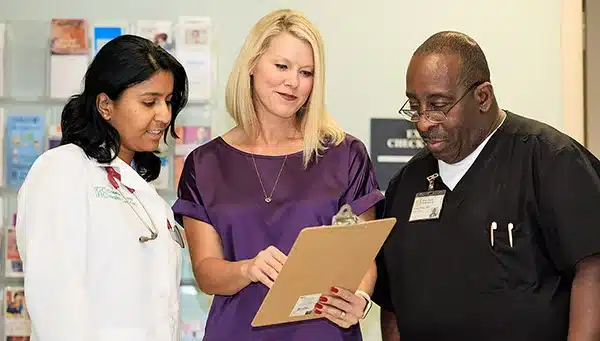
Collaboration is also reflected through Greene County Schools. During an appointment, a patient is informed about the integrated care model and asked if they would like immediate services or future services with a therapist on site.
Lamson said the students, in the College of Health and Human Performance based primarily in the Department of Human Development and Family Science and including the School of Social Work, have undoubtedly saved lives. Greene County Health Care CEO Melissa Torres has proof of ECU’s role in Greene County Health Care’s growth.
“For many years, ECU students were the only therapists providing mental health care in our clinics,” Torres said. “Over time, our partnership with ECU helped lay the groundwork for building our own behavioral health team. More therapists means more patients receive care.”
The first funding in 2006 came from the Kate B. Reynolds Foundation in partnership with Greene County Health Care. In 18 years, $4,105,762 has been secured and 154 students have received graduate assistantships to deliver integrated behavioral health care.
Greene County Health Care is celebrating 50 years this year and has five clinics offering medical, dental and mental health care covering a 17-county area.
Lamson, a Nancy W. Darden Distinguished Professor in HDFS and the university’s interim assistant vice chancellor for economic and community engagement, Torres and others have enjoyed seeing an uptick in the dental aspect and effectiveness in Greene and Pitt counties.
“One of our practice managers attributes the increase to three things: the students’ easy-going and approachable personalities, (Lamson’s) excellent rapport with our dental assistants and the students’ flexibility in approaching patients,” Torres said. “Our partnership with East Carolina University is a natural fit. East Carolina’s values are student-centered, inclusive and committed to service. Those values complement our mission and vision. Our mission is to provide compassionate, quality care, every day for all people. … The partnership gives ECU students an opportunity to learn about and serve their community as a whole, providing care to people who would otherwise not get the care they truly need.”
With mental health, Lamson said a major part of the development of student training focuses around an important question to patients — have you had thoughts of whether you would be better off dead?
“If you haven’t received training in how to ask that question and then what to do with the information, that can be really scary for the student and for the patient,” Lamson said. “What I have said time and again is I can promise you that our team is going to be ready to ask that question, and know what to do with the results. People need us to ask that question and many times, they want us to ask that question.”
National mental illness awareness week is Oct. 1-7. This year’s theme is “Together we care. Together we share.”
That is a fitting theme for what Lamson described as attempts locally to continue to reduce the stigma associated with discussing mental illness and suicidal thoughts.
“It needs to be a part of conversation, so we can really begin to make sure we are saving people’s lives,” Lamson said.
In 2005, ECU created the first doctoral program in the nation in medical family therapy. Many graduates have remained in eastern North Carolina for professional opportunities, which Torres said has helped patients of Greene County Health Care receive full care.
Alex Hernandez is a current ECU medical family therapy doctoral student who has embraced and benefited from his role with Greene County Health Care patients.
“Learning how the medical world works and how mental health is integrated into that world, this has been great and I’ve learned a lot, because it’s a huge learning curve,” Hernandez said. “It definitely prepares you. This is precisely what I want is doing therapy in the medical world, understanding that health is not just physical health or mental health. It is all of it together. That is what we practice and that is why we’re here.”
Seeing people collaborate and commit to this integrated care model has brought great pride to the co-creators of ECU’s medical family therapy doctoral program.
“The success of this collaboration and the integrated care services we have delivered across eastern North Carolina could not have been possible without the earliest vision and commitment of Dr. Jennifer Hodgson, and our partners, Dr. Tom Irons and Mr. Doug Smith, along with hundreds of devoted therapists, health coaches and our most current GCHC leadership,” Lamson said. “Most of all, this program could not have been possible without the patients who trusted our team for their care.”
Health and well-being are at the very heart of creating economic vibrancy in a community. That is why Brian Floyd, chief operating officer of ECU Health and president of ECU Health Medical Center, joined a group of statewide health care leaders at the NC Chamber Health Care Conference on a panel titled “Working Together to Create Healthier Communities” on Sept. 14 in Durham.
Speaking to a packed room of health care, business, industry and government leaders from across the state, Floyd spoke about ECU Health’s unique position in eastern North Carolina as both the largest health care system and employer in the 29 county region, and the importance of maintaining high quality and high value care in rural communities.
“Thinking about the NC Chamber and what we’re here to talk about today, it’s important to remember North Carolina is the second largest rural state in the country,” said Floyd. “One-in-three people in North Carolina lives in a rural community so rural health care is a very critical and very personal endeavor. At ECU Health, we take our mission seriously to improve the health and well-being of eastern North Carolina, which is a region with some of the highest levels of poverty in the state.”

ECU Health is a leader in rural health care, Floyd said, and is constantly exploring new ways to improve access to care for rural communities. Speaking to topics such as improving mental health resources, partnering closely with schools, colleges and universities and investing in the health and well-being of team members, Floyd made it clear ECU Health’s role in the East goes far beyond just delivering health care.
“ECU Health is a health care provider, an educator and an economic engine for our 29 county region and we understand that collaboration is key to solving health care challenges,” Floyd said. “When I think about what we do, the reason we have a 974 bed hospital in a town of more than 80,000 people is because of the tremendous burden of disease in the communities we serve. Improving quality and cost is our goal and our clinical care component certainly plays a role in that, but we know that value is created by improving wellness through initiatives that tackle social determinants of health.”
Floyd was joined on the panel by Dr. Art Apolinario, board president of the N.C. Medical Society, Dr. Creagh Milford, senior vice president of retail health for CVS Health and Jennifer Sacks, associate director of the clinical operations program lead for Biogen. The panel was moderated by Gary Salamido, president and CEO of the NC Chamber.
Greenville, N.C. – ECU Health and the Brody School of Medicine at East Carolina University’s Lora Joyner was recently selected as the National Bleeding Disorders Foundation (NBDF) Physical Therapist of the Year. Each year, NBDF honors those who have made significant contributions to the inheritable blood and bleeding disorders community at its annual Awards of Excellence program.
“It is an honor to be recognized for my life’s work as a physical therapist in the bleeding disorder community by fellow therapists, health care professionals, patients, families, and HTC colleagues,” said Lora Joyner, MS, PT, PCS, physical therapist and clinic manager at ECU Health Hemophilia Treatment Center (HTC). “I am grateful that my name will be associated with Donna Boone and previous award winners and recognized as a role model and mentor for current and future health care professionals in the bleeding disorder community.”
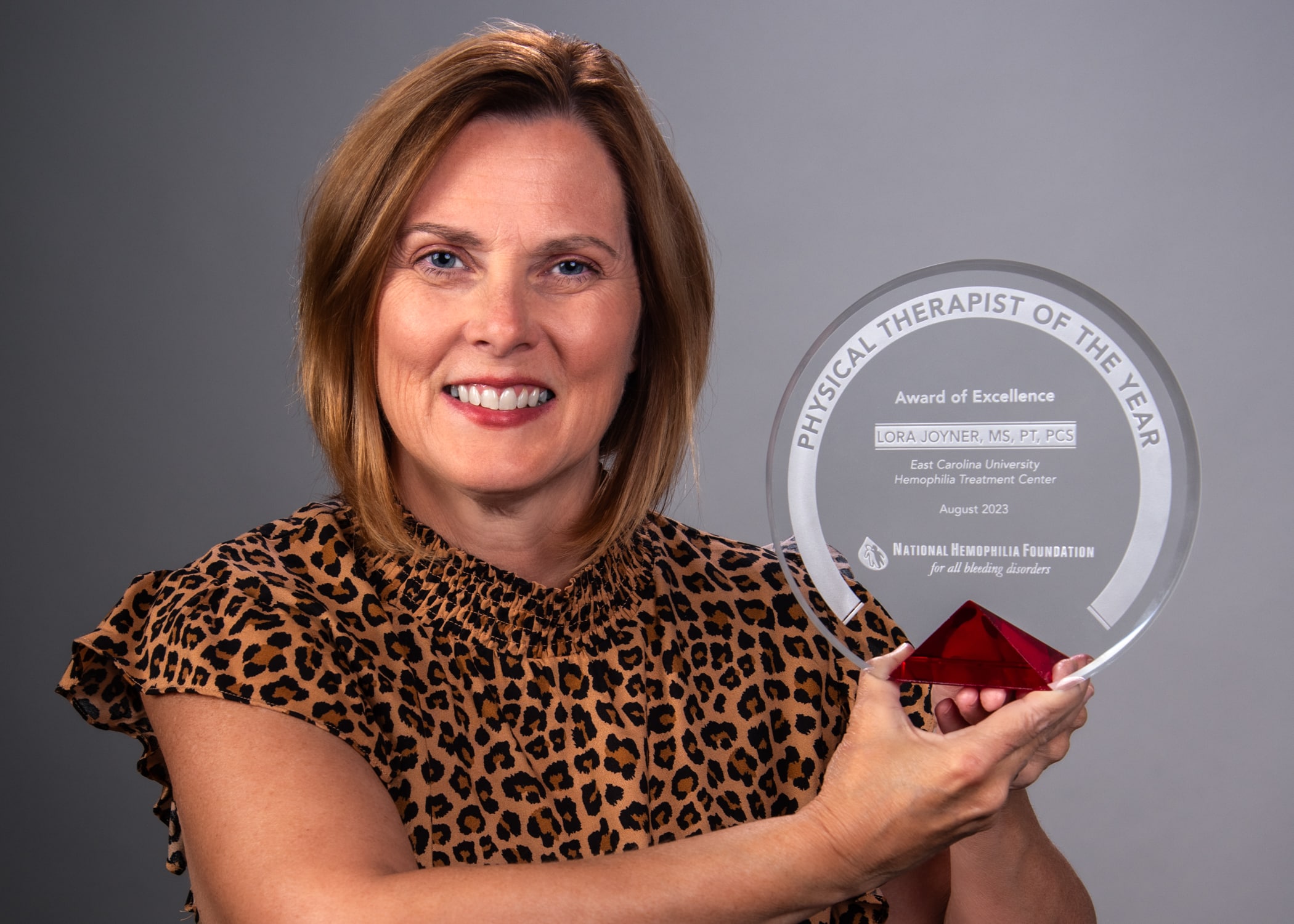
Physical Therapist of the Year, given in honor of Donna Boone, PT, honors an individual who has demonstrated service to the inheritable blood and bleeding disorders community above and beyond their daily responsibilities in an HTC PT role. This person serves as a role model for others in the physical therapy field and has a minimum of two years’ experience working with individuals with blood or bleeding disorders at an HTC. Donna Boone was a pioneer in physical therapy and bleeding disorders and served as a mentor for many professionals.
“We are proud of Lora for all of the hard work, dedication, and leadership she has put into this clinic and into our patients,” said Dr. Beng Fuh, director of pediatric hematology and oncology, “Bleeding disorders, sickle cell disease and cancer are life-changing diagnoses for patients and their families. Lora is an invaluable asset and works hard to ensure patients can live their best lives as possible after diagnosis. Lora’s passion for her patients is reflected by this well-earned achievement.”
Joyner has worked at ECU Health HTC for 32 years as a physical therapist and as the clinic manager for seven years. As HTC manager, Joyner is responsible for selecting patients for clinical trials and research, supporting transition needs of the clinic, quality improvement and writing grants and reports. As a physical therapist, Joyner is responsible for treating any muscular skeletal complications, most commonly joint or muscle bleeds. If left untreated long enough, joint/muscle bleeds can cause chronic pain, long-term joint problems and limited mobility. Joyner also facilitates safe participation in sports and physical activity of patients, including medication management, which allows patients to live an active and fulfilling life. Additionally, Lora has held leadership roles in multiple regional and national organizations. She is the currently the national chair of the physical therapy committee of the NBDF.
“When you see the joy on the face of a little one when you say ‘yes you can play baseball’ after their diagnosis, after they’ve thought they wouldn’t be able to do normal activities, that’s one of my favorite parts of my day,” Joyner said. “All parents dream that their children are able to do normal things, and I’m able to help children do that.”
ECU Health HTC is a nationally recognized comprehensive lifespan clinic with both adult and pediatric specialty services that is one of only three in North Carolina and is part of a national network of over 140 Comprehensive Hemophilia Diagnostic and Treatment Centers, which provide comprehensive specialty care to people with rare inherited bleeding disorders and their families.

